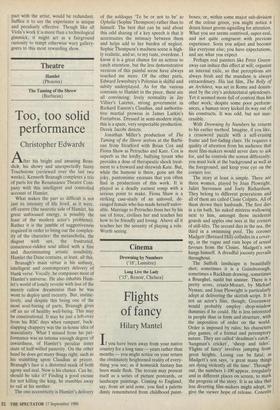Theatre
Hamlet (Phoenix) The Taming of the Shrew (Barbican)
Too, too solid performance
Christopher Edwards
After his bright and amusing Bene- dick, his showy and unexpectedly funny Touchstone (reviewed over the last two weeks), Kenneth Branagh completes a trio of parts for the Renaissance Theatre Com- pany with this intelligent and controlled account of Hamlet.
What makes the part so difficult is not just its intensity of life lived, as it were, off-centre (the neurotic side of Hamlet, his great unfocused energy, is possibly the least of the modern actor's problems). Rather it is the jumble of suggestiveness required in order to bring out the complex- ity of the character: the melancholia, the disgust with sex, the frustrated, conscience-ridden soul allied with a fine and discriminating artistic sensibility. Hamlet the Dane contains, at least, all this.
Branagh's main virtue is his unfussy, intelligent and contemporary delivery of blank verse. Vocally, he compasses most of Hamlet's universe. He also inhabits Ham- let's world of lonely reverie with less of the merely callow dreaminess than he was wont to deploy until recently. But, instinc- tively, and despite this being one of the most soul-baring of parts, Branagh gives off an air of healthy well-being. This may be constitutional. It may be just a left-over from his RSC days when rampant, back- slapping chappery was the in-house idea of masculinity. What I missed from his per- formance was an intense enough degree of inwardness, of Hamlet's peculiar inner state of half-willed passivity. On the other hand he does get many things right, such as his stumbling upon Claudius at prayer. Branagh's face is a distorted mask of both agony and zeal. Now is his chance. Can he, should he take it? Finding a good excuse for not killing the king, he stumbles away to rail at his mother.
The one eccentricity is Hamlet's delivery of the soliloquy `To be or not to be' to Ophelia (Sophie Thompson) rather than to himself. The best that can be said about this odd sharing of a key speech is that it accentuates the intimacy between them and helps add to her burden of neglect. Sophie Thompson's madness scene is high- ly realistic, and so, to my taste, overdone. I know it is a great chance for an actress to catch attention, but the less demonstrative versions of this painful scene have always touched me more. Of the other parts, Edward Jewesbury's Polonius is skilful and subtly underplayed. As for the various contrasts to Hamlet in the piece, these are all convincing: lively normality in Jay Villier's Laertes, strong government in Richard Easton's Claudius, and authorita- tive martial prowess in James Larkin's Fortinbras. Dressed in semi-modern style, this is a spare, very respectable production. Derek Jacobi directs.
Jonathan Miller's production of The Taming of the Shrew arrives at the Barbi- can from Stratford with Brian Cox and Fiona Shaw as Petruchio and Kate. Cox is superb as the lordly, bullying tyrant who provides a dose of therapeutic shock treat- ment to a froward and shrewish Kate. But, while the humour is there, gone are the joky, pantomimic excesses that you often find in productions of this work. It is played as a deadly earnest romp with a serious point to make. Fiona Shaw is a striking case-study of an unloved, de- ranged female who has made herself unlov- able. Marriage to Petruchio frees her by his use of force, civilises her and teaches her how to be friendly and loving. Above all it teaches her the serenity of playing a role. Worth seeing.


































































 Previous page
Previous page